
V17, N23
Monday, Feb. 13, 2012

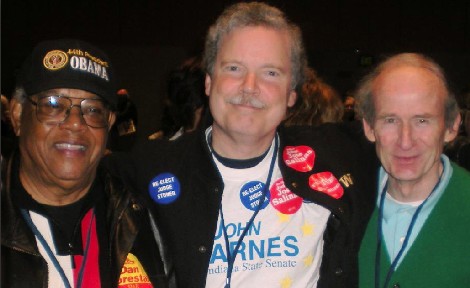
HPI Analysis reveals strong likelihood of GOP Super Majority, poised to win most
of 11 open seats;
Bauer will be challenged
By BRIAN A. HOWEY
GREENCASTLE, Ind. - The magnitude of seismic Republican Statehouse gains that have Indiana Democrats careening from disaster to catastrophe came into clearer focus on Friday when 12 House Democrats with
a combined tenure of 236 years did not
file for reelection.
The looming retirements make the Republican super majority of 67 seats - needing a pickup of seven - a
Retiring Democrat Reps. Bill Crawford (left) and John Day (right) at the Marion County Democratic slating on Saturday, with former Rep. John Barnes, who was defeated in the disastrous 2010 election cycle. Barnes opted to run for the Indiana Senate this cycle.
races shows that of the 10 open seats due to redistrict-
distinct probability. Add in the GOP
retirements and the House will be losing 340 years of experience,
an unprecedented departure of institutional tenure.
An HPI analysis of House![]()
Why elect secretary of state?
By JACK COLWELL
SOUTH BEND - Charlie White, now a convicted felon, got 976,810 votes to win big for Indiana secretary of
state in 2010.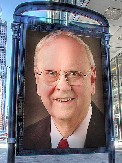
Of the nearly one million Hoosiers who voted for Charlie, how many knew anything about him other than party affiliation?
Not many. Maybe 5 per- cent. Maybe a little more. Maybe not. And how many voters
have any idea what the secretary of
state does?
Not many. Indiana’s
ing, Republicans are in the driver’s seat in just about all of them. A 70-seat majority is not beyond the scope.
State Reps. Chet Dobis, Nancy Dembowski and
Craig Fry did not file for reelection by the noon deadline
Continued on page 3
![]()


‘‘We draw from all walks of life. There’s political science and political art. I embrace the art
of politics.”
- Kristi Risk, 8th CD Republican candidate
Page 2
HOWEY Politics Indiana
Weekly Briefing on Indiana Politics Monday, Feb. 13, 2012
Howey Politics
Indiana
is a non-partisan newsletter based in Indianapolis. It was founded in 1994 in Fort Wayne.
Brian A. Howey, Publisher Mark Schoeff Jr., Washington Jack E. Howey, editor Beverly K. Phillips, associate
editor
Subscriptions
$350 annually HPI Weekly
$550 annually HPI Weekly and
HPI Daily Wire.
'Call 317.627.6746
Contact HPI
Howey Politics Indiana
6255 Evanston Ave. Indianapolis, IN 46220 www.howeypolitics.com bhowey2@gmail.com
'Howey’s cell: 317.506.0883
'Washington: 703.248.0909
'Business Office: 317.627.6746
© 2012, Howey Politics Indiana. All rights reserved. Photocopy- ing, Internet forwarding, fax-
ing or reproducing in any form, whole or part, is a violation of federal law without permission from the publisher. v

secretary isn’t exactly high profile like
a Hillary Clinton, the U.S. secretary of state, who deals with every inter- national crisis. Never is there need for the Indiana official to seek sanc- tions against Michigan for developing nuclear weapons.
Allegations about White us- ing a false address to vote, run for secretary of state and retain a Fishers Town Council seat were raised publicly before the 2010 election.
Voters, if they saw some news item about it, ignored it as just more political bickering and involving some guy for some office that didn’t much matter to them.
White won by over 300,000 votes, not because voters knew him, but because he was running on a state Republican ticket breezing to victory
as the political pendulum swung back in a basically Republican state after Barack Obama two years before had carried Indiana.
Also, voters who actually looked at the names instead of just the party affiliations saw a choice between the solid sounding name of Charlie White and the strange sound- ing name of the Democratic nominee, Vop Osili.
A Hamilton County jury found the allegations were more than just political bickering and found White guilty on six felony charges involving vote fraud, perjury and theft. He was accused of using his ex-wife’s address in fraudulent voter registration to
meet residency requirements for his
$1,000-a-month Fishers Town Council salary.
Gov. Mitch Daniels has named an interim secretary of state, and White will be out permanently un- less a judge at sentencing reduces the felonies to misdemeanors.
Too bad the governor couldn’t have appointed a secretary of state in the first place.
The office should not be elec- tive.
If Daniels had been filling a
vacancy back in November of 2010, he never would have picked Charlie White. While voters didn’t focus on White’s problems, Daniels would have picked someone more qualified.
Now there is messy litigation over whether the governor can fill the vacancy or whether the second place finisher, Osili, will become secretary of state.
Now there are recriminations. An angry White lashed out at Daniels, who had been calling for his resigna- tion, saying in a Fox News interview that the governor was guilty of vote fraud because of voter registration “at the governor’s mansion, where every- body knows he does not live.”
So there is more attention now on secretary of state than there ever was during that last campaign.
The attention should result in taking the office off the elective ballot. That would require an amend- ment to the Indiana Constitution, and chances of that are slim, to say the least.
It would, however, make sense. If a secretary of state is need- ed, the secretary should be appointed by the governor in the way that a president appoints the U.S. secretary of state to serve in the Cabinet.
Voters do focus on governor and president and hold those execu- tives responsible for the quality of their appointees. They won’t focus on Vop vs. Charlie.
It could be that the office isn’t even needed. One candidate for secretary of state, Tim Jeffers, the Democratic nominee in 1994, actu- ally campaigned on a promise to seek to abolish it. To prove the point, he showed a video of person-on-the- street interviews with 90 Hoosiers, only four of whom had any idea what the secretary of state does.
One correctly responded that the secretary is the keeper of the state seal.
Jeffers said the lieutenant governor probably could safely keep
Page 3
HOWEY Politics Indiana
Weekly Briefing on Indiana Politics Monday, Feb. 13, 2012

the seal. He said securities regulations, corporate filings
and election responsibilities of the office could be shifted to
existing departments, saving money for taxpayers.
The office has sometimes been used as a stepping stone for higher office.
But there is no reason for the state to provide a
stepping stone for aspiring politicians. Charlie White slid off the stone. And he never should have been stepping there is the first place. v
Colwell has covered Indiana politics over five de- cades for the South Bend Tribune.
![]()
Friday, joining Dale Grubb, Dan Stevenson, William Craw- ford, John Day, Jeb Bardon, Dave Cheatham, Scott Reske, Mary Ann Sullivan, and Dennis Tyler in the biggest House exodus in modern Hoosier history. Democrats controlled the redistricting in 1991 and 2001, and the exodus follow- ing those revamps did not approach this level.
In February 2002 after House Democrats drew the new maps, only three Republicans, then in a 53-47 minor- ity, retired: Reps. Dean Mock, Brent Steele (who ran for
the Senate), and Mike Herndon. They were joined by four Democrats – Reps. Gary Cook (who ran for mayor of Plym- outh), Dick Bodiker, Mike Dvorak (who ran for St. Joseph County prosecutor) and Speaker John Gregg.
Three current Democrats are in or seeking other offices: Reske in the 5th CD, Sullivan for the state Senate in SD36, and Tyler is now the mayor of Muncie.
Retiring Republicans are Ways and Means Chair- man Jeff Espich, and Reps. Dick Dodge, Rich McClain, Ralph Foley, Phil Hinkle, Tom Knollman, and David Yarde. They have 104 years of tenure. Yarde is challenging State Sen. Sue Glick in the GOP primary.
Bauer challenge inevitable
The looming disaster is already prompting some Democrats to think about dumping Minority Leader B. Patrick Bauer. Lake County Democratic Chairman Thomas McDermott Jr., told HPI that with former Rep. Trent Van Haaften filing in HD76 - a lone bright spot for the caucus
- to run in a race with State Rep. Wendy McNamara that he abandoned as part of the 2010 disastrous “Bayh Domi- noes,” a leadership challenge to Bauer is inevitable.
“Rep. Trent Van Haaften, if he’s successful in his re- turn to the General Assembly, has already made clear he’s challenging Bauer,” McDermott said. “One way or another (Bauer) gets challenged.”
On Wednesday, Gov. Mitch Daniels, speaking to Hamilton County Republicans in Carmel, said of Bauer, “We have been blessed by our opposition. My heart is full of gratitude, really.”
The big question is whether that challenge hap- pens in the coming weeks, with Democrats fretting at Bauer directing the caucus campaigns after his gutter
tactics helped create the 40-seat minority during the 2010 election cycle.
The biggest surprise Friday was with Dobis, who was elected to the House in 1970. He was drawn into a dis- trict with State Rep. Vernon Smith, then purchased a home in Schererville. But when the filing dust settled, Republican Lake County Councilman Rick Niemeyer of Lowell had filed and he emerges as a favorite for at least one GOP pickup. Democrats filing include Lon Childress, Al Cottingham and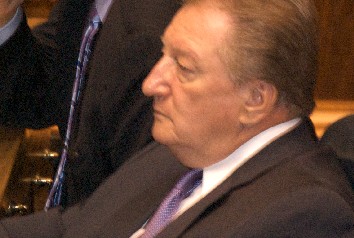
State Rep. Chet Dobis battled with Bauer and lost his leadership position in the process. (HPI Photo)
John T. Hart. Dobis did not comment on his decision. He had battled Bauer, calling him “paranoid” in recent years, and lost his leadership position when he and Bauer sparred over the Illiana Expressway bill. In 2011, House Speaker Brian Bosma appointed the Democrat to a committee chair- manship, an unprecedented move aimed at power shar-
ing, but seen by Bauer as an invasion of his caucus power circle.
The Dobis bug out is indicative of the treacherous path Bauer has led House Democrats and the realities of the new GOP-drawn maps.
“We wanted a bigger name to fill that spot for us,” said McDermott, “but with the make-up of the district, it was hard to convince them it was a winnable seat. I’d say Rick Niemeyer is the favorite to win the 11th District.”
In addition to Dobis, Democrats could lose HD5
Page 4
HOWEY Politics Indiana
Weekly Briefing on Indiana Politics Monday, Feb. 13, 2012

that Fry is leaving and Sullivan’s HD97, along with open seats in areas represented by Reske and possibly Cheatham in Southern Indiana where Indiana Demo- crats are seeing their base dra- matically erode during the 2010 debacle.
Two consecutive years of bitter fighting over the Right to Work, education reform and abortion restriction legislation and a distinct minority of 40 seats left a number of House Democrats questioning the civil- ity of the process. Grubb quit
as caucus chair in January after divisions surfaced within the cau- cus over the walkout. Cheatham announced he wouldn’t seek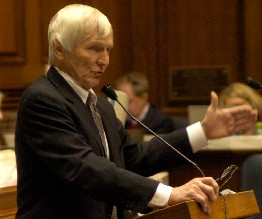
Ways and Means Chairman Jeff Espich decided against a primary with State Rep. Dan Leonard. WBAT radio host Gary Snyder believed that Leon- ard would have been favored. (HPI Photo)
terpart. The retiring duo had combined for 80 years of service.
Espich, R-Uniondale, announced his retirement in a letter to the Fort Wayne Journal Gazette on Friday, rather than take part in a GOP primary showdown with State Rep. Dan Leon- ard, R-Huntington, that local observers believed would have favored Leonard. “I have worked hard and tried to lead well. I hope I have succeeded in the minds and hearts of my constituents,” Espich said. “But, in fact, it has been
an easy task to act in their interests. This is because I share their belief in the importance of faith and traditional American values in our lives and soci- ety. I have never had to compromise
my actions or act in ways that were not in support of the thoughts of my neigh-
another term, citing the contentious atmosphere in the
House.
bors.”
He pointed to other representatives now serv-
Democratic diaspora
But there were other reasons for the Democratic diaspora.Tyler was elected mayor of Muncie. Fry ran for mayor of Mishawaka in 2011, but an Indiana Democratic Party direct mail piece accusing Mayor Dave Wood of hiring a child molester backfired in epic fashion. Fry lost what
was expected to be a competitive race by an astounding
76-24% margin and his House reelection this year was far from assured. Democrat Jerod Warnock and Republicans Dale DeVon and Cory Stith have filed and it is unclear who might have an advantage this fall.
Dembowski decided to retire when she was placed in HD20 with Tom Dermody. Other retirements due to redistricting included Stevenson, who gave way to Mara Candeleria Reardon. Reske was drawn into a hostile HD37 and opted to run for Congress. Barden was also drawn into a district with another Democrat and decided to retire. Sul- livan’s new HD97 that is much more Republican prompted her to run against State Sen. Brent Waltz.
In 2010, the House Republican Campaign Com- mittee targeted a number of Democratic caucus leaders, defeating Bob Bischoff, Paul Robertson and Nancy Michael. They barely missed Grubb, who won by fewer than 500 votes.
House leadership retire instead of upset
Unlike legendary Indiana Senate leadership that left office with the sting of defeat at the ballot box, the Indiana House is seeing a change of the guard with the retirements of Espich and Crawdord, his Democratic coun-
ing southwest Allen County and Wells County, including Leonard, Kathy Heuer, R-Columbia City, and Matt Lehman, R-Berne. “These incumbent representatives are all my friends. All of them serve the same principles of faith and
traditional American values that most of us hold dear. They each do a great job serving their constituents and will do likewise in their new area in the coming years,” Espich said. “For these reasons, I have decided not to seek re-election as a state representative.”
Speaker Bosma praised Espich, saying, “Jeff Espich is the most dedicated and talented citizen legislator I have had the privilege of working with over the course of the past two decades. His constant eye on the taxpayer’s bot- tom line and incredible attention to detail have protected the citizens of our state beyond what they will ever realize. He will be sorely missed and fondly recalled as a dedicated and frugal public servant for many years to come.”
Crawford announced last year that he would retire and Marion County Democrats have slated Robin Shack- leford, who ran a spirited but unsuccessful race against Hinkle in 2010. Both Crawford and Espich were elected
to the House in 1972 and alternated as Ways and Means chairmen for most of the past two decades.
Espich and Crawford entered the legislature a couple years after legendary Senate leaders President Pro Tempore Bob Garton and Finance Chairman Larry Borst. Borst was upset for reelection in 2004 by Waltz and Garton was defeated in 2006 by Greg Walker. Espich and Crawford followed in the footsteps of power house legislators Pat Kiely, Paul Mannweiler and John Gregg, who retired in their prime.
Page 5
HOWEY Politics Indiana
Weekly Briefing on Indiana Politics Monday, Feb. 13, 2012

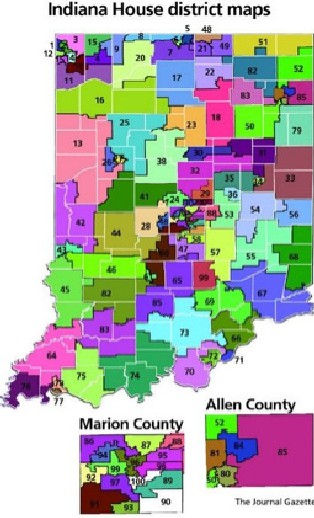
11 GOP primary battles
The other emerging story line is the plethora of Republican primary battles, though virtually none take aim at the historic 2010 freshman class.
Eleven GOP in- cumbents facing primary opponents include Doug Gutwein in HD16 (Lunch- pail Republican Diane Boersma);Timothy Wesco in HD21, who faces Lunchpail Republican Randy Conner; Rebecca Kubacki in HD22 (Jon D. Hare); Don Lehe in HD25 (Franklyn Voorhies); Kathy Kreg Richardson in HD29 (Steven R. Powell); Heath VanNatter in HD38 (Stephen A. Wilson and David E. Brown); Timothy Neese in HD48 (Bristol businessman Jerry Brew-
ton and Randall Weinley); Bob Cherry in HD53 (Sam Weist); Kathy Heuer in HD83 (Keith Potter); Phyl- lis Pond in HD85 (against perennial candidate Denny Worman); and Robert Behning in HD91 (Michael A. Scott).
Other than Boersma, Hare and Conner, it is unclear at this writing which of the challengers are being supported by the Lunchpail Republican PAC. Chairman David Fagen has said, “Though the Lunch Pail Republicans PAC was formed to run candidates against incumbents who vote for overreaching legislation like ‘Right to Work,’ we are pre- pared to use our resources to protect incumbents who are attacked for voting against this bill.”
Only three House Democrats – Earl Harris in HD2 (Ricardo Garcia); Charlie Brown in HD3 (Gary attorney and State Board of Education member Tony Walker); and Vernon Smith in HD 14 (Sherman D. Carson) - are facing
primary challenges. The Brown-Walker race bears watching due to the challenger’s credentials.
In HD100, a district likely to stay Democratic, Sally M. Johnson, Jonathan Katz, Zach Mulholland and Dan Forestall have filed and will face former Republican India- napolis Councilman Scott Keller. Forestal, a firefighter, was endorsed by Marion County Democrats Saturday.
How the open seats stack up Of the 11 open seats drawn without an incumbent, HPI’s earli- est forecast has Republicans with an excellent shot at nine of them, including:
n HD11 with Rick Niemeyer (whose father, Ernie, was a former state senator) with the winner taking on the winner of the Demo- cratic primary that includes Lon Childress, Al Cottingham and John Hart. McDermott was unsure which Democrat would emerge. “All of
the candidates are relatively new,” McDermott said.
n HD13 where Attica Clerk-Trea- surer Sharon Negele (who narrowly lost to Grubb) faces Stephen Aich- ner and Dan Young with the winner taking on Democrat Mark Straw.
n HD17 where Culver Coca- Cola executive Frances Ellert (who lost narrowly to Rep. Dembowski
in 2010) faces Republican Timothy Harman in the primary with no Democrat filing.
n HD24 where Steven Braun of Zionsville is favored over Kiefer C. Dobbs and Mindi Fisher McMillan, with the winner taking on Democrat Maurice O. Fuller.
n HD37 where Todd Huston, a member of the State Board of
Education and former chief of staff to Supt. Tony Bennett,
is taking on Indiana Township Association President Debbie
Driskell. No Democrat has filed.
n HD47 where Republicans Leonard Compton, Mark Meadows, John Price and John T. Young have filed (but no Democrat).
n HD51 where Dr. Dennis Zent is facing Aaron Claudy in the primary and Lon Keyes has filed for the Democrats.
n HD52 where Gary Harbaugh, Paul Moss, David Powers and Ben Smaltz have filed with the winner taking on Democrat Charles Odier.
n HD55 where former USDA official Bob White is facing Republicans Sam Harvey, Lora N. Williams and Cindy Meyer Ziemke with the winner taking on Democrat David Moeller. White has a big fundraising advantage.
n HD64 where Republicans James Amick and Thomas W. Washburne have filed with the winner facing Democrat Mark Norton.
Page 6
HOWEY Politics Indiana
Weekly Briefing on Indiana Politics Monday, Feb. 13, 2012

n HD82 where David Ober, a protege of State Sen. Jim Banks, is facing Mike Caywood, De- nise Lemmon, and Wesley Ortell with the winner fac- ing Democrat Mike Wilber.
n HD92 where former Marion County sher- iff candidate Tim Motsinger is facing GOP primary chal- lenges from Brad Rider and Richard B. Scott Sr. with
the winner taking on either Democrats Brian M. Cooper, Tyjuan Garrett or Karlee D. Macer.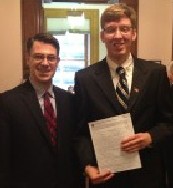
State Sen. Jim Banks (left) with
HD82 protege David Ober.
campaign questioned;
Wallace continues on
By BRIAN A. HOWEY
NASHVILLE, Ind. - As John Gregg addressed a la- bor rally in Evansville Saturday, he called his opponent U.S. Rep. Mike Pence a “son of a Mitch.”
And as the imaginary backyard sports commentator would say, “The crowd goes wild.”
The Gregg campaign faced a week of some con- sternation and doubt after his surprising statement in the wake of the Right to Work law Gov. Mitch Daniels signed
n And HD97 where Republican A. J. Feeney-Ruiz has been slated by the Marion County GOP with the winner taking on Democrat Justin Moed.
n HD100: Former Republican Councilman Scott
Keller has filed. Forestal is be favored.
Early HPI favorites in the open seats include Nie- meyer in HD11, Negele in HD13, Ellert in HD17, Braun in HD24, Huston in HD37, Zent in HD51, White in HD55, Ober in HD82, Motsinger in HD92 and Feeney-Ruiz in HD97. That list shows the GOP favored in 10 of the 11 open seats.
In HD60, Peggy Welch will likely face Morgan County Clerk Peggy Mayfield. Welch was drawn into the district with Foley, who is retiring. Mayfield faces a GOP primary that includes Keegan Clark and Daniel Elliot. The district is distinctly Republican, but Welch has a history of winning in GOP districts.
In HD76, Van Haaften will take on Rep. McNamara, the race that should have happened in 2010 until U.S. Sen. Evan Bayh abruptly abandoned his reelection, U.S. Rep. Brad Ellsworth entered the Senate race, Van Haaften the
8th CD, and Sen. Bob Dieg HD76. All lost.
The other noteworthy trend is that credible Demo- crats like John Barnes and Sullivan have opted to run in the Senate and not the House.
Epilogue
The combination of Republican-controlled redis-
tricting, the avalanche of Democrat experience headed for retirement, Republicans favored in a vast majority of the open seats, a still unpopular President Obama, and
Pat Bauer calling the shots for a House Democratic caucus still stinging from the awfully executed campaign of 2010 is leading to a Republican super majority in the Indiana House, poised to join their Senate counterparts.
Or, if you’re a Democrat, this is a Bauer-induced
disaster heading toward catastrophe.v
when he said, “It’s time to move beyond this divisive issue.
Indiana needs a governor and a legislature that show up
for work every day and work together with one focus – cre- ating jobs, whether it’s for a union or non-union workplace. Because in the end, it doesn’t matter if you’re in a union or not. If you get laid off, you’re not bringing home a pay- check.”
Some House Democrats were furious, believing that Gregg had dissed their walkout strategy that finally ended the week before the Super Bowl. So was Hammond Mayor Thomas McDermott Jr., who told HPI that somehow, Gregg must not have received the “memo.” Nancy Guyott
of the AFL-CIO called the statement “a bit inartfully draft- ed.”
“I would hope that what John Gregg said was meant in a different context,” said State Rep. David Niez- godski, a leading opponent of Right to Work. “We had every right to do what we did, and we were given that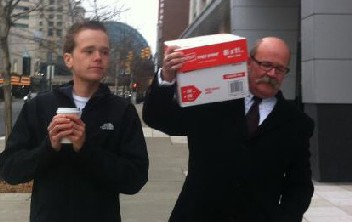
John Gregg and son prepare to file his signatures on Wednesday.
HOWEY Politics Indiana
Page 7
Weekly Briefing on Indiana Politics
Monday, Feb. 13, 2012

right by the constitution. It would certainly be my hope that we can move forward, working together in a bipartisan manner for jobs, because the Demo- cratic caucus’s number
one priority is jobs.” Gregg quickly
snapped into damage control mode, posting on his Twitter account, “I support the right of
Hoosier workers to orga- nize and have stood with Indiana legislators and others fighting to protect this right.”
The message on Facebook was: “Now that Right to Work has been jammed through the legis- lature on purely partisan political lines, my focus is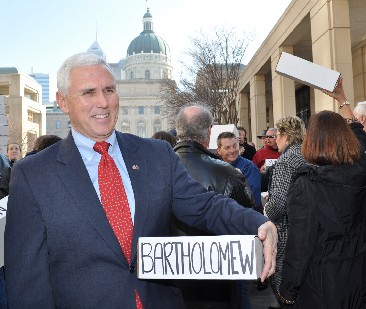
U.S. Rep. Mike Pence files at Government Center South on Tuesday.
(Pence campaign photo)
ly primed and motivated for
a fight, as evidenced by the
250 people who showed up to hear Gregg and U.S. Rep. Joe Donnelly in Evansville Saturday. But labor turnout was light at the Gregg cam- paign kickoff in November and the campaign doesn’t appear to have a network of labor liaisons in place.
Read today’s lead story in Howey Politics Indi- ana and Gregg becomes the indispensable Democratic man. If he cannot muster a competitive campaign – and it already trails Pence $5 million to $1.7 million in the money war – Democrats
up and down the ticket are facing a historic assault. Gregg must use the labor base, convince independents
on moving to unite our efforts around what should be ev-
ery elected official’s top priority – Democrat or Republican
– and that is creating good-paying jobs for Hoosiers.” There was a letter to supporters, where he said, “As you know, a statement does not always convey the tone or the tenor of the message. We cannot let the media twist the comments into something divisive.”
Internally, some powerful Democrats fretted at the Gregg campaign’s vetting process. The statement was sent out by campaign manager Rebecca Pearcy. The campaign doesn’t appear to have a fulltime spokesperson. While Gregg is unopposed in the primary, Democrats know that a campaign can be won or lost in the early days of the cycle, as John McCain can attest after he wrapped up the presi- dential nomination in early 2008.
The Hotline observed: Any time you’re explaining
to the state’s largest paper that you are not taking shots at someone or something, it’s a pretty good sign that you’ve said something you shouldn’t have said in the first place.
In 1996, under the tutelage of Democratic pros like Robin Winston, John Goss and Tom New, the campaign of Lt. Gov. Frank O’Bannon laid out a finely tuned nuts and bolts effort. O’Bannon was out-raised by Indianapolis Mayor Stephen Goldsmith, the prohibitive Republican favorite. In that kind of atmosphere, a campaign must be well struc- tured and there must be an opening to exploit. In 1996, it was Goldsmith’s poor handling of the Meridian Street police riot.
Beyond that, the Democratic labor base is obvious-
that Pence is part of a historically unpopular congressional cabal, and hope for that opening.
Wallace to forge ahead
Republican Jim Wallace found himself short 14
signatures this week, but on Friday decided to forge ahead. Wallace said he believes the campaign has enough signa- tures, saying at a Friday presser, “Our documentation was irrefutable,” and called the scenario a “hiccup.” Wallace added, “I wouldn’t expect that there’s any more basis to challenge it than any of the other candidates. It’s never a good thing to have a hiccup like this. On the other hand, at the very least, I think we’ve identified a challenge inside of the system for ballot access. And if at the end of the day the voters decide I’m not the candidate for them, I’d like to think that we’ve at least surfaced an issue.”
But to keep Wallace off the ballot, a voter will have to challenge. With the ISTA helping Wallace collect signa- tures, it’s unlikely a Democrat will. A best case scenario is for Wallace to use $2 million of his own money to bloody
up Pence and the loathed Congress, keeping Gregg in the game.
“When you’re chief executive, you can’t just be a Christian conservative Republican,” Wallace said. “You have to represent all the people.”
The Pence campaign seems indifferent about Wal- lace, with spokesman Matt Lloyd saying it would not chal-
lenge the Wallace candidacy. v
Page 8
HOWEY Politics Indiana
Weekly Briefing on Indiana Politics Monday, Feb. 13, 2012

Seybold, Delph
(and Burton) shape
the final 5th CD field
By BRIAN A. HOWEY
NASHVILLE, Ind. - Hours after State Sen. Mike Delph decided not to seek the 5th CD – an office for which many believed he would be Dan Burton’s heir apparent – the Carmel Republican received this email:
“Needless to say I’m the most relieved pollster in Indiana. Look forward to working for your re-election and someday soon enough a race for higher office. Your kids
are young. I’m a grandfather now. Time goes fast.”
That email was from David McIntosh pollster John McLaughlin. The fact that Delph might have been there to activate the remnants of Rep. Burton’s political net-
work, infused with his popularity in Tea Party circles, had the potential to alter the dynamics of what will soon be a knock-down-drag-out primary of Republican fratri-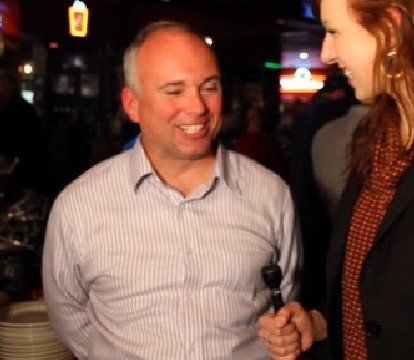
cide.
not to run against Dan Burton,” Seybold told HPI. “When the seat became open, we viewed it as perhaps a once in a lifetime opportunity.”
Seybold joins a field that includes former Con- gressman David McIntosh, former District Attorney Susan Brooks, former Marion County Coroner John McGoff, Fish- ers attorney Jack Lugar, Jason Anderson, IMPD Lt. Mat- thew Mount and William “Bill” Salin (though not the Salin Bank executive or the former secretary of state), who is an Indianapolis business analyst. Anderson is a customer development manager from Noblesville.
Seybold has $50,000 in his municipal campaign warchest, but cannot use those funds in a federal race. “If we have one big hurdle, that’s it,” he said of the money race. Both McIntosh and Brooks reported more than
$400,000. In his favor, Seybold said, is “I am someone who has dealt with the federal government from the local level. We bring a different viewpoint.”
The third term mayor, who won in 2003 with 62%, in 2007 with 67% and was reelected last year with 56%, made the final decision after talking with his wife. He also said he talked with Burton.
So with this field set without Burton - who has held the seat since 1982 - where does it stand now? And where might it end up in 13 weeks?
HPI believes McIntosh enters as a slight favorite.
For Delph, it was a matter of not wanting to be away from his young daughters. “Missing mornings and evenings with my girls is not a sacrifice I am willing to make,” said Delph of the decision he made last Saturday. He had $200,000 in campaign commitments he would not have been able to collect until after the Indiana Gen- eral Assembly’s scheduled sine die on March 14.
Stepping into Delph’s void – and a seri- ous contender to pick up the Burton mantle
-– was three-term Marion Mayor Wayne Seybold. “The mayor and I have always been close and
I anticipate he will have the support of most of the Burton organization, if not the Congressman himself,” Delph told HPI. WBAT’s “Gary Snyder Show” was reporting over the weekend that a Burton endorsement of Seybold is imminent.
Their friendship extended back several cycles ago when Seybold pondered a challenge to Burton. Delph said his advice at the time was
to concentrate on being mayor, and other oppor- tunities will arise. “He can be a congressman or
a lieutenant governor or beyond,” Delph said of
Seybold.
“We have made the decision over time
Marion Mayor Seybold is interviewed by an Indiana Wesleyan University stu- dent after winning his third term last November with 56% of the vote. (Indiana Wesleyan University Photo)
Page 9
HOWEY Politics Indiana
Weekly Briefing on Indiana Politics Monday, Feb. 13, 2012

McIntosh and Brooks have money parity - he with
$426,783 reported in the 4Q and $314,218 cash on hand, she with $446,828 raised and $325,000 cash on hand. But informed and reliable district sources tell HPI that McIn- tosh’s district name ID is about 28%, compared to 33% for Seybold and Brooks under 5%.
Brooks’ and McGoff’s likely strategy will be to build their name ID while pummeling McIntosh on issues such
as his residency – the issue is in vogue these days – and the fact that the former congressman cut a deal with GOP heavyweights such as Jim Kittle Jr., P.E. McAllister and Fred Klipsch to run in the 5th CD and not the 6th, where the
big money is behind Luke Messer. McIntosh sold his home in Muncie but maintained an apartment in Pendleton while working in Washington for much of the past decade.
Essentially, this race is going to get nasty quickly.
And where will it likely end up?
McIntosh is one of the luckiest politicians in modern Indiana history. His first foray in Congress came in 1994 when he entered, then watched U.S. Rep. Phil Sharp retire and Republican Auditor Ann DeVore forget to
file her candidacy. He then caught the Republican tsunami that year. McIntosh has a vein of national money that will continue to flow into his campaign, sources tell HPI. And his wife, Ruthie, really really wants David to return to Con- gress.
Both Brooks and McGoff have fabulous resumes. McGoff’s name ID is much higher than Brooks’, but he hasn’t had a track record of fundraising prowess. If McGoff can change that, he could be a credible player down the homestretch, particularly with his 2008 and 2010 primary strength coming from Hamilton and Marion counties.
HPI’s perceived pecking order at this early stage is: McIntosh, Seybold, McGoff and Brooks. But that will almost certainly change depending on the execution of these cam- paigns. Should be a fabulous race to watch. HPI Primary Horse Race Status: Leans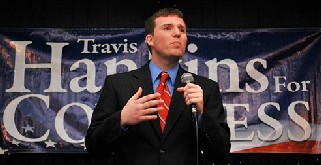
McIntosh.
2nd CD: Walorski favored
Former legislator
Jackie Walorski is a heavy favorite, not only in the pri- mary but in the general. She first must fend off Dr. Greg Andrews, a family physician from South Bend, in the GOP
primary. HPI Primary Horse Race Status: Safe Walorski, Safe Mullen.
3rd CD: Kolbe didn’t file for Dems
The news in U.S. Rep. Marlin Stutzman’s district is
that former Republican Kosciusko County Prosecutor David Kolbe was not listed on the final Secretary of State’s filing list on Friday. Kolbe had announced earlier this month he would run as a Democrat, saying the Republican Party had left him behind, but he said in a statement Friday, “I have reassessed my capacity to engage in the immense work necessary in such a campaign. Personal and family chal- lenges have arisen which have led to this reassessment.” Running for the Democratic nomination is an unknown field: Kevin R. Boyd, Stephen G. Hope, Justin Kuhnle,
John F. Roberson, Tommy Schrader and David Sowards. Stutzman, who will become dean of the Indiana GOP delegation now that Burton and Pence aren’t returning, will be a heavy favorite. HPI Primary Horse Race Status: Tossup.
6th CD: Messer’s campaign to lose
Former legislator Luke Messer stands out in this
eight-man field. It also includes 2010 U.S. Senate candidate Don Bates, Jr., 9th CD challenger in 2010 Travis Hankins, perennial candidate Bill Frazier, along with John Hatter, Joe Sizemore, Allen K. Smith II, and Joseph Van Wye, Sr.
Messer has a huge money edge with $415,440 raised in 2011 and $290,405 cash on hand. Hankins was second at $161,364 and $68,051 cash on hand, and Bates had $104,306 raised and $30,440 cash on hand. These three represent the credible candidates in this field. Messer has other big advantages. His near upset of Rep. Burton
in 2010 has boosted his name ID. In his 2000 race against U.S. Rep. Mike Pence, he carried Wayne and Hancock coun- ties, and represented Shelby and Decatur counties when he
was in the Indiana House. He has big money and Jennifer Hallowell, one of the top GOP strategists in the state.
Hankins has an intriguing grassroots organization, coming in second in the 9th CD primary
in 2010 to Todd Young and ahead of former congressman Mike Sodrel. But much of that network is in the new 9th, and not the
new 6th. Bates has some residual
primary. On the Democratic side, Brendan Mullen is the establishment primary and will face Dan Morrison in the
Travis Hankins used a grassroots, Tea Party-based campaign
to finish second to U.S. Rep. Todd Young in the 9th CD in
2010, but much of that network is in the new 9th, not the new
6th where he is running this year. (Hankins Campaign Photo)
name ID from his Senate run. But
both Hankins and Bates will have to find an issue or two to pin on Messer and money to convey it,
Page 10
HOWEY Politics Indiana
Weekly Briefing on Indiana Politics Monday, Feb. 13, 2011

otherwise Messer’s 12-year dream of becoming a congress- man will be realized this cycle. HPI Primary Horse Race Status: Likely Messer.
7th CD: May likely to challenge Carson
Carlos May enters the Republican race to find a
nominee against U.S. Rep. Andre Carson as a frontrun- ner. He is seen as an up-and-comer in Indianapolis GOP circles. He has a crowded but undistinguished primary field of Steven Davis, Tony Duncan, Wayne Harmon, JD Miniear, Catherine “Cat” Ping, and Larry B. Shouse. While the new
7th CD is not as strong Democratically as the old one, no one in either Indianapolis or Washington is talking as if this seat will be in play this fall. HPI Primary Horse Race Status: Likely May.
8th CD: Bucshon has big $ advantage
U.S. Rep. Larry Bucshon is facing a Tea Party chal-
lenge from Owen County housewife Kristi Risk. Bucshon has a big money advantage: $127,000 raised, $394,000 cash on hand, compared to Risk, who raised just $23,982 and has $10,959 cash on hand. Risk will try to activate the Tea Party network that prompted the biggest sur-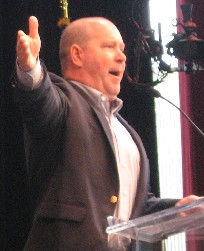
prise on primary night 2010 when Bucshon fended her off by just a 16,262 to 14,273 in an eight-man field. With just two in the race this time, Risk hopes she can consolidate the Tea Party vote and upset Bucshon.
Despite all of the posturing of the Tea Party, they have yet to win anything of note in Indiana, with Risk and Hankins coming close in
2010 while U.S. Rep. Marlin Stutzman won a 3rd CD caucus after losing in the U.S. Senate primary. Risk has to hope she can put it together at the ballot box, but Bucshon’s money will make that tough. In her favor is the Congressional approval at a historically low 10%. If she can tag that on Bucshon, there might be a race here. The winner will likely take on former legislator Dave Crooks, a
Washington, Ind., Democrat. HPI Primary Horse
Race Status: Likely Bucshon.
9th CD: Tossup for Dem primary
U.S. Rep. Todd Young is unopposed in his primary
and will face one of five Democrats: former Lee Hamilton aide Robert Winningham, Gen. Jonathan George, John Griffin Miller, John Tilford and Shelli Yoder. The Demo- cratic primary will likely come down to Winningham and George. Winningham reported raising only $23,846 and
had $21,190 cash on hand. The FEC website does not have a report from George. HPI Primary Horse Race Status:
Tossup. v
Bucshon taking arrows
from right and left
By MARK SCHOEFF JR.
WASHINGTON - Freshman Republican Rep. Larry Bucshon, 8th CD, acknowledges that he and his 88 first- term GOP colleagues haven’t slashed the federal budget deficit the way they intended when they stormed into Washington in 2011.
They have, however, changed the budget frame of reference, according to Bucshon.
“The one thing that the people I was elected with changed in the big picture was the direction or maybe the thought process about how the federal government spends its money,” Bucshon said in a recent HPI interview in his Capitol Hill office.
The conversation has now moved “away from where are we going to spend to where are we going to create efficiencies and effectiveness in the government and decrease the spending in Washington,” said Bucshon, who
is a cardiothoracic surgeon.
The challenge he faces as he tries to earn a second term this year is that his opponent on the right doesn’t think he’s gone far enough in cutting Washington spending while his foe on the left asserts that he’s undermining Medicare.
Kristi Risk, a substitute teacher in the Spencer-Owen school system and Christian counselor who is running against Bucshon in the Repub- lican primary, criticizes him for supporting extensions of the federal budget that prevented a government shutdown.
She also says he should not have voted for a measure that averted a default of the federal debt.
“He voted for every continuing resolution and the debt ceiling,” Risk said.
In doing so, he missed opportunities to whack away at what she sees as overbearing government institu- tions, such as the Environmental Protection Agency.“The best way to curb it is to defund it,” Risk said.
Bucshon doesn’t regret his votes.“You can’t let the U.S. federal government default on its debt,” Bucshon said. “It was the right thing to do for the country.”
The Democratic candidate for the 8th CD seat this fall attacks Bucshon from the opposite direction. Former
Page 11
HOWEY Politics Indiana
Weekly Briefing on Indiana Politics Monday, Feb. 13, 2012

state Rep. Dave Crooks says that the Newburgh congressman’s votes in favor of a budget pro- posal last year by House Budget Chairman Paul Ryan, R-Wis., would de- stroy Medicare.
Under the Ryan plan, instead of directly paying for Medicare cov- erage, the government would provide subsidies for participants to buy their own insurance.
Crooks said seniors “stop me on the street constantly” to express concern over Medicare vouchers.
Kristi Risk on her Owen County farm. (Evansville Courier & Press
Photo by Tom Langhorne)
would mean that the mu- nicipal group in Bloomington would not be able to hold
up the I-69 extension over environmental concerns.
“This is a common sense provision that I think is go- ing to significantly benefit Indiana,” Bucshon said.
While the candidates argue over policy, Bucshon has taken a lead in the money race. As of Dec.
31, he has raised $537,311 and has $394,368 on hand, according to the Federal Election Commission. Crooks has raised $311,824 and
has $245,237 on hand. Risk has raised $23,982 and has
“They don’t want their Medicare dismantled,” Crooks said. “They don’t want it privatized. He’s picking oil companies making record profits and billionaires – giving them more tax breaks – over senior citizens in this district. They’re going to punish him for his choices this November.”
Bucshon said in a statement that Crooks is playing fast and loose on Medicare.
He maintains that the health care bill approved
by the previous Democratic Congress – and which he says Crooks supports – requires nearly $600 billion in Medicare cuts.
“It is a shame Dave Crooks and the [Democratic Congressional Campaign Committee] cannot campaign on the issues and instead have resorted to attempts to scare senior citizens,” Bucshon said in a statement. “As a physi- cian who spent 15 years caring for Medicare patients, I am disappointed, but not surprised by this.”
In his interview with HPI, Bucshon stressed that he is making a difference for the district through his work on the House Transportation and Infrastructure Commit- tee. The five-year $260-billion highway funding measure is scheduled for a House vote this week.
Bucshon wrote a provision that would allow states to take federal dollars from bike trails or beautification initiatives or any other program and redirect them toward emergencies, such as the fissures that closed the Sherman Minton Bridge between Louisville and southeast Indiana.
“You shouldn’t have money sitting in an account and have an infrastructure problem and not be able to use federal dollars to fix it,” Bucshon said.
He also championed a provision that would allow states to proceed with multi-state projects over the objec- tion of metropolitan planning authorities. In Indiana, this
$10,595 on hand.
“We’ve communicated well with all 18 counties,” Bucshon said. “We’ve worked hard on constituent services. I go home every weekend. We’ve gotten a lot of positive feedback. I’m pretty optimistic.”
Crooks also exudes confidence. The Democratic Party cleared the primary field for him, and he is included in the DCCC’s second tier of races.
The district also has lost Republican-leaning areas
– such as Putnam, Fountain and Warren counties – and gained Democratic territory – such as Perry, Spencer, Du- bois and part of Crawford Country.
Crooks, who owns radio stations in Washington, Ind., and Vincennes, said he benefits from his tenure as the voice of the Washington High School basketball program, which has produced Indiana University star Cody Zeller and won state championships.
“That’s a unique advantage we have that’s beyond the bad votes Bucshon has taken,” Crooks said.
Risk’s operation is not as well funded as Bucshon’s and Crooks’. But she said she has grass-roots enthusiasm that goes beyond the Tea Party. She has about 75 consis- tent volunteers.
“We draw from all walks of life,” Risk said. “There’s political science and political art. I embrace the art of poli- tics.”
She’s also trying to take advantage of skepticism toward Washington, D.C. “There’s a real negative tone toward Congress, but it’s real positive for us,” Risk said.
Bucshon will find out in the primary whether that
attitude dominates southwest Indiana. v
Page 12
HOWEY Politics Indiana
Weekly Briefing on Indiana Politics Monday, Feb. 13, 2012

Dems, not SuperPACs
come to aid of Mourdock
By BRIAN A. HOWEY
NASHVILLE, Ind. - Conventional wisdom about the the Indiana U.S. Senate race was that a national Super PAC would eventually come in and save Richard Mourdock’s moribund challenge to Sen. Dick Lugar. But instead of FreedomWorks or Club for Growth, the stalking horse is the Indiana Democratic Party in tandem with disgraced former Republican secretary of state Charlie White.
Hours after his conviction of voter fraud and per- jury, White told Fox News that not only had Gov. Mitch Dan- iels voted “fraudulently,” but
so had Lugar. White and host Eric Shawn also blasted Lugar and former U.S. Sen. Evan Bayh for continuing to vote from Indiana addresses while
residing near Washington, D.C. “You will hear a lot more from me about the equal
application of the law that has been applied to me versus those that are rich and famous,” White said.
That was followed by a Fox News report last weekend that revealed Lugar had spent only 325 nights
in Indiana since 1977 and had charged taxpayers $50,000 for hotel rooms. The Indiana Democratic Party gleefully pumped out press releases of that story.
“At the very least, Senator Lugar should be com- pelled to better explain the more than 20 years’ worth of taxpayer dollars used to fund his travel expenses in Indi- ana,” Chairman Dan Parker said.
“(Senator Lugar) spends a quarter of the every year in the state,” said campaign spokesman David Willkie, telling Fox News that between February 1 of 2011 and
2012, Lugar has spent 89 days in Indiana. And while Lugar is not “domiciled” in Indiana, he does own a farm in the state which he still manages. Willkie mentioned a line the campaign developed last year when the story first broke on the blogosphere. “It’s just like the United States military,” said Willkie. “If you’re military personnel and in defense of this country, in service to this country, and you’re overseas you keep your last place of residence.”
Parker pounced: “Senator Lugar needs to apologize immediately. Our men and women in uniform serve in dangerous conditions thousands of miles from home and face enormous risks to keep us safe. Comparing their service to choosing to live in a million-dollar home in the suburbs of Washington, D.C., is insulting.”
The Lugar campaign reasons that if owning or
renting two homes is required for service in Congress, only the wealthy will serve.
Lugar received an opinion from then Attorney Gen- eral Linley Pearson that equated his Senate service to that of serving the country in other ways, including the military.
On WBAT’s Gary Snyder Show on Friday, the Lugar campaign noted that Lugar resides in “all of Indiana.”
Indiana Democrats seemed to be taking a page from October 2010 when the party sent mailers suppos- edly backing Libertarian candidates in the 2nd and 9th CDs, attempting to split off conservative support from Jackie Walorski and Todd Young as the party tried to salvage U.S. Reps. Joe Donnelly and Baron Hill. Donnelly eked out a tiny victory while Hill lost by 14%.
The Democratic motive is clear: it would rather have Donnelly face Mourdock than Lugar next fall. Internal Donnelly and Lugar polling shows that the Democrat would fare much better against Mourdock.
The issue could be a dangerous one for Lugar. With Gallup revealing approval of Congress at just 10%,
any widespread perception of detachment could come back to haunt Lugar, who appears to be in much better shape against Mourdock than he was a year ago. Since that time, Mourdock has been a fundraising flop.
Mourdock took aim at earmarks, saying, “I am ap- palled by the fact that Senator Lugar doesn’t understand the need to end a practice that lends itself to abuse and corruption at taxpayers’ expense.”
Club for Growth President Chris Chocola, who has held off support for Mourdock thus far, criticized Lugar and
12 other Senate Republicans for opposing a permanent ban on earmarks. “Senate Republicans who oppose a perma- nent ban on earmarks are hopelessly out of touch with
the mainstream of the Republican Party and the American people,” Chocola said.
Lugar has defended earmarks as preserving a congressional duty guaranteed by the Constitution. Lugar maintains that Congress ceding spending control to the executive branch would be foolish.
Lugar’s TV and radio campaign ads have focused on the Keystone Pipeline “jobs” issue while calling on the Obama administration to repeal its stance on con- traception. Lugar cosponsored the Respect for Rights of Conscience Act. The U.S. Chamber of Commerce launched a multi-state television ad and grassroots communications blitz in 12 House races and eight Senate races, the Hotline reported, including an ad on behalf of Lugar.
As for Mourdock, he skipped the Hamilton County Lincoln Day Dinner last Tuesday - attended by 560 Re- publicans - and opted for a Tipton County Tea Party event with his base. That kind of campaign prioritizing have early Mourdock supporters like Howard County Chairman Craig
Dunn questioning their endorsement. v
Page 13
HOWEY Politics Indiana
Weekly Briefing on Indiana Politics Monday, Feb. 13, 2012

Santorum up next
for a Mitt mash
By MARK SOUDER
FORT WAYNE - There is nothing like winning three elections in one night to get the front-runner’s attention. Rick Santorum won Iowa, Mitt Romney won New Hamp- shire, and then Newt Gingrich won South Carolina. Newt ran smack into the Romney negative crusher machine, again. In Iowa the Romney and Ron Paul negatives de- stroyed Gingrich.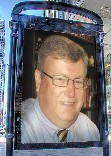
After rising again on what for Newt was a positive (“I won’t be the food stamp President”) and a nega- tive (John King should be ashamed of the example he set for Americans), Romney pummeled Gingrich in Florida. This is the official definition of pum- meling: In the last 48 hours Romney and his allies ran 13,000 ads and
Newt ran 200.
After Romney won Nevada by a decent but not overwhelming margin, last Tuesday he ran into Santorum.
Santorum was the first candidate to top 50%, winning every county in Missouri. Not only did he whip everyone in Minnesota, but Romney struggled into a weak third even with the backing of Governor Pawlenty. Then, in a huge shock, Santorum also won Colorado by 5%. Santorum won
241 counties, Romney won 16, Paul won four, three were tied and Gingrich took one.
It was a very bad night for Gingrich with his only win by 25-22 over Santorum. Most presidential candidates don’t like to run behind “tied.”
The media theme line, that Santorum does well in the rural boondocks, the home of evangelicals, who still question Darwin’s theory of evolution because they haven’t watched Henry Fonda as Clarence Darrow (they have no TV). The theme line was challenged when Santorum also won Minneapolis, St. Paul, Kansas City, St. Louis and Colo- rado Springs. Besides the shock that there are apparently evangelicals who have moved into cities, it was decided that the Catholic bishops had gotten Catholics dispropor- tionately excited.
Having neglected to point out before this week that Santorum is Catholic, they had some fast explaining to do but now had a new conspiracy theory. Of course, Min- nesota also has a lot of Lutherans, but they apparently are considered like Protestant Catholics since Luther was a for- mer monk. They insist Santorum is still a fringe candidate,
only appealing to Catholics, Lutherans and evangelicals as opposed to most Americans, who apparently are Unitar- ians.
If that point seems unclear, you obviously went to bed early or watched Fox News.
Since Santorum now has won four contests, Rom- ney three, and Newt one (all others zero), it is clear what will happen next: Out will come the big bucks from the Mitt Mashing machine. It worked on Gingrich, and Perry, but will it work on Santorum?
As some have said, compared to Gingrich’s baggage, Santorum has carry-on luggage. However, Foster Fries, funder of Santorum’s super-PAC, doesn’t print the same quantities of money as even Gingrich had. Santo- rum’s campaign is thrilled to raise a million dollars, which
is what Romney probably spent on just the noon news broadcasts in the last two days in Florida.
The money, organization and calendar all favor Romney. The only counter to that is that it has also been true so far as well. In fact, if the trio of Gingrich, Paul and Santorum pick different states to focus upon, it could be even more challenging.
Santorum could micro-manage it even further by focusing on, say, the Cincinnati through Dayton area in Ohio, cheaper areas of Oklahoma and some other select areas on Super Tuesday, possibly Grand Rapids or Lansing for Michigan. Paul can look for student and anti-war areas. Gingrich could – well, he doesn’t plan – but he will win Georgia (presumably), possibly do well in neighboring Ten- nessee, and maybe do well in Arizona (even with its large Mormon population).
With proportionate delegate allocation, it is some- thing of a nightmare for Romney. Suddenly you see the advantages of Romney nuking Santorum.
Santorum must overcome becoming the condemn- ing social conservative, which so far he has done reason- ably well, but he must broaden his base rapidly. He must stay calm and not turn into a Newt-like whiner or angry man when Romney goes after him. He must raise money. He must get better organized.
Still, the fact remains that his negatives are lower, he does better among women than expected, and has a message for industrial states. He also served as a congressman from a Democrat suburban district of Pitts- burgh, and comes from a coal miner family. It is not impos- sible for Santorum to be the nominee, but still is unlikely.
So is a brokered convention, but the odds have increased from minimal to just unlikely.
Santorum is also not on the ballot in Virginia. In Indiana, if the law is strictly interpreted as opposed to in- tent of the law, and Santorum is kept off the ballot because of technicalities in 24 signatures (which is what most of those not for other candidates would call them), there will
Page 14
HOWEY Politics Indiana
Weekly Briefing on Indiana Politics Monday, Feb. 13, 2012

be outrage among conservative activists, including me, who will blame the Republican establishment, including Gov. Romney. Romney may try a George H.W. Bush in New Hampshire against Reagan by denying others the debate opportunity because “he didn’t make the rules.” Bush was correct, but never recovered. People know lack of fairness when they see it.
These elections are already stacked for the wealthy and candidates backed by them. Blocking people’s right to vote for major candidates (Santorum has won
as many contests as Romney) would likely lead to move-
ment to Gingrich and possibly against Lugar as well. The challenge for Romney, who many conservatives, including me, supported last time, is how to get to the convention without destroying any remaining desire of conservatives to unite behind him.
There is a distinct danger that just yelling “Obama” is becoming like yelling “liberal.” It scares you, but you can get over it more rapidly than you once could. Conservatives
want to hear some substance, not just trash-talking. v
Souder is a former Republican member of Congress.
![]()
Charlie’s convictions had
Lake Democrats smiling
By RICH JAMES
MERRILLVILLE - A host of Lake County Democrats were smiling last weekend as a result of the turn of events in Indianapolis. And, no, they weren’t reveling over the New York Giants’ win in the Super Bowl.
What had them looking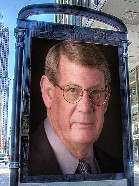
like Cheshire cats was the convic- tion of Secretary of State Charlie White, a Republican, on six felony charges evolving around illegal voting.
What the Lake County Democrats were chanting was, “That’s your man, Mitch.”
A Republican has gone wrong? Could it be true? Ap- parently not all the instances of vote fraud are confined to Lake County. And where is the hue and
cry from Gov. Mitch Daniels condemning White’s wrongdo-
ing? Maybe another time.
This is the same governor who chastised Lake County Democrats at a public appearance in Griffith a couple of years ago. “You are entitled to all the lousy, crummy, graft-ridden government you are prepared to pay for,” Daniels said.
That’s a heck of a thing for a governor to say about a region of his own state. It’s a real plus for econom- ic development, Mitch. While Lake County has had more than its share of public corruption, things are getting better.
While White waits to see if there will be jail time in his future, Lake County government officials are taking a step they should have long ago.
In part prompted by Lake County Sheriff John Bun-
cich, county government officials and their employees are
about to go to ethics school. The county council and com- missioners are in the process of bringing in the county’s Shared Ethics Advisory Commission that was formed six years ago by several municipalities in the county.
It is a rock-solid organization headed by Cal Bellamy, the former chairman of Bank Calumet who now spends most of his time trying to make Lake County a bet- ter place. They don’t come any better than Bellamy.
It’s unfortunate the county didn’t make such a move when it was being pushed to do so several years ago at a time when Lake County government was facing heavy criticism for the way it operated. There was fear on the
part of some that if the party didn’t publicly improve its im- age, the voters might throw them out.
The guy leading the charge was U.S. Rep. Peter Visclosky, D-Merrillville, who also is called the unofficial mayor of Lake County. Visclosky pushed the individual county offices to volunteer for audits and ethics training. Some did, but more didn’t.
Buncich, a few weeks back, issued an order to his merit and civilian employees to not do anything to compro- mise their integrity. In other words, if you aren’t sure about accepting a gift, don’t do it.
Ethics training, of course, involves a lot more than when to accept or reject gifts.
Among other facets are favoritism, the use of government property for personal business, and reporting fraud and corruption.
It would be nice if Mitch would publicly make note of what the county is doing when he makes his next visit up north. Oh, and he might want to bring Charlie White
with him. v
James is the former editorial page editor and colum- nist for the Post-Tribune in Merrillville.
Page 15
HOWEY Politics Indiana
Weekly Briefing on Indiana Politics Monday, Feb. 13, 2012

Why is Obama campaign
opening up an office?
By BRIAN A. HOWEY
INDIANAPOLIS - On Thursday, the Obama for America campaign opened up a campaign office in Indi- ana, a state with a century-old love affair with the internal combustion engine. It is a state that any Republican will tell you is certain to return to the “red” Electoral College
column next autumn.
There is credence to that line of thought, with a Public Opinion Strate- gies Poll in December showing President Obama’s approval in Indiana stood at 42 percent, and disapproval at 55 percent; wicked numbers for any incumbent.
So why is the Obama campaign investing assets in a state they have no chance of winning?
Because some believe Indiana isn’t a lost cause. An internal poll for U.S.
Rep. Joe Donnelly’s Democratic Senate campaign showed that Obama trailed probable (er, possible) Republican nomi- nee Mitt Romney by just 4 percent. An NBC/Wall Street Journal poll in January revealed that 37 percent of Ameri- cans were more optimistic about the economy - the high- est level in more than a year and a 7 percent jump from December. Democratic pollster Peter Hart explained, “The psychology about the economic conditions has switched. The old saying is ‘a rising tide lifts all boats’ - then clearly - this economic optimism has clearly lifted Obama’s ratings.”
In January during President Obama’s State of the Union address, he hit on one subject that has everything to do with Indiana: the American auto industry. “On the day
I took office, our auto industry was on the verge of col- lapse,” Obama said. “Some even said we should let it die. With a million jobs at stake, I refused to let that happen. In exchange for help, we demanded responsibility. We got
workers and automakers to settle their differences. We got the industry to retool and restructure.”
“Today, General Motors is back on top as the world’s number-one automaker,” Obama said. “Chrysler has grown faster in the U.S. than any major car company. Ford is investing billions in U.S. plants and factories. And
together, the entire industry added nearly 160,000 jobs. We bet on American workers. We bet on American ingenuity. And tonight, the American auto industry is back.”
And it is. General Motors has regained its position
as the world’s top automaker and its plants are humming in Fort Wayne, Marion and Bedford. Chrysler is hiring off the street in Kokomo.
While there is great Tea Party angst about all the bailouts, a fact worth noting is that the domestic auto bail- out from the TARP fund occurred under Republican Presi- dent George W. Bush.
In December of 2008, I attended a hearing in Indianapolis where economists from the Brookings Institute predicted that a collapse of GM and Chrysler could cost the state 150,000 jobs. Not just at GM and Chrysler, but com- panies like Cummins and hundreds of auto supplier compa- nies scattered in small towns and large across the state.
The multiplier impact from such a collapse could have been devastating. Not only would toolmakers, engi- neers, assemblers and molders be jobless, but thousands of restaurants and service businesses would have been devastated. While Indiana has a troublesome and persis- tent 9 percent jobless rate today, a collapse of GM and
Chrysler would have brought a second Great Depression to Indiana. We easily could have seen the jobless rate double or more.
Indiana Republicans were conspicuous in their indifference. Gov. Mitch Daniels warned of the U.S. govern- ment throwing “good money after bad” and said the do- mestics should emulate the Japanese companies. He later castigated the U.S. Supreme Court for the way it acted on Obama’s forced expedited bankruptcies of GM and Chrysler. Treasurer Richard Mourdock, with Daniels cheering him on, tried to thwart the Chrysler merger with Fiat.
An exception was Marion Mayor Wayne Seybold, who lobbied Congress for a solution. He had 800 jobs at stake at the Marion GM plant. “I had Republicans ask me if I had lost my mind,” Seybold said. “But some times you’ve got to make decisions based on your population.” The Mar- ion GM plant has since invested $600 million in upgrades and now employs 1,700 workers.
Indiana Democrats in the 2010 cycle never raised the auto industry issue and were mauled in the process. President Obama and Vice President Biden came to Kokomo - three weeks after the 2010 elections - to
revel in the restructuring and opportunity to come. I asked Donnelly why Democrats didn’t mount a defense, and he could only smile wistfully and say, “That’s a good question. I don’t know.”
That probably won’t happen this year. Donnelly will challenge either Sen. Dick Lugar or Mourdock in the Senate race. He is sure to bring it up. He is sure to remind Hoosiers of their distinct auto heritage, and who was there when the industry was on the verge of collapse. This is why the Obama campaign is opening up an office in Indiana.
It’s still far below the dozens of offices the campaign had across Indiana in 2008 and winning Indiana will be a long shot, just like it was in 2008. But it will lay the groundwork in case the auto industry issue resonates with Hoosiers.
And it should, unless you like Depression. v
Page 16
HOWEY Politics Indiana
Weekly Briefing on Indiana Politics Monday, Feb. 13, 2012

Eric Bradner, Evansville Courier & Press: In- stead of owning a home in the Hoosier state, Republican U.S. Sen. Richard Lugar lives in Virginia and stays in hotels when he visits the place he has represented for 36 years. It’s perfectly legal. Still, Lugar’s Republican primary op- ponent and eventual Democratic foes want to make sure that fact takes a prominent place in the public eye dur-
ing this campaign season. At the center of an effort to defeat Lugar, both by tea party-backed Republican state Treasurer Richard Mourdock and Democratic U.S. Rep. Joe Donnelly, is the need to (depict) Lugar as what Mourdock calls a “globe-trotter” who has lost sight of his home state. Criticism over his residence is the latest example. “This is just a story about Richard Lugar being out of touch. He,
in effect, punishes Hoosiers by billing taxpayers for hotel rooms when he comes to his hometown. It’s inexcusable,” said Ben Ray, an Indiana Democratic Party spokesman. Ac- cording to Indiana Attorney General Greg Zoeller,
that’s no problem, since Indiana’s constitution allows those in the service of the nation to keep their last address. The Lugar campaign brushed off the criticism, saying the senator spent 89 days in Indiana over the last year. And, Lugar political director David Willkie said, Lugar is following the law. “It’s the same as when Dick Lugar was in
the United States Navy, he kept his residency there. When Lugar is in town, he sometimes tends to a family farm that he manages, located in southern Marion County. It’s 600 acres of corn, soybeans and walnut trees. Lugar trims the trees, though he hires a farmer to handle the corn and soy-
beans.” Can any of the complaints stick? It’d be tough. v
Doug Ross, NWI Times: From a Northwest Indiana perspective, watching the Charlie White political implo-
sion has been entertaining and informative. Ask downstate politicians what they think of Northwest Indiana politicians, and the terms “Democrat” and “corrupt” too often are used interchangeably. There have been numerous examples of public corruption convictions involving Democrats in North- west Indiana, sure, but White proves the Democrats don’t have a monopoly on crooked politicians. v
Larry Riley, Muncie Star Press: Indiana’s senior member of Congress, the quite senior Richard G. Lugar, stopped by Muncie this week to show a few Republicans he’s still alive and kicking as he enters his 7th -- and per- haps not even last -- campaign for U.S. Senate. Lugar has been a staple for the GOP in the Senate since 1976. The last time he ran, Democrats didn’t even run an opponent against him. This time around is a different story: One of own party, or at least a wing of it, opposes him in the pri- mary, though defeating a six-time incumbent rolling in $4
million of campaign cash won’t be easy. Lugar’s stopover Monday was low key as 25 supporters crowded the tables in the basement of Vera Mae’s to hear the politician now deemed a statesman (that happens when you stick around long enough) speak off the cuff for an hour. He was quick to tell those listening that he understands the key issue of this year’s elections: “jobs, jobs, and jobs.” v
Sheila Suess Kennedy: I have this mantra that I am sure annoys the hell out of the students in my policy class: “It’s more complicated than that.” It is part of my effort to explain that policy decisions frequently have consequences beyond those that we can easily identify–be- yond the superficial issues that pundits exploit for ratings and politicians employ to agitate their bases. The auto bail- out was a perfect example, and in his column today, Brian Howey does a great job of explaining why the policy choice
was not the simple matter of “bailing out losers” that Tea Party activists and libertarians evidently believe it was. As Howey writes “In December
2008, I attended a hearing in Indianapolis where economists from the Brookings Institute predicted that a collapse of GM and Chrysler could cost the state 150,000 jobs — not just at GM and Chrysler but also at companies like Cummins and hundreds
of auto supplier companies scattered in small towns and large across the state. The multiplier impact from such a collapse could have been devastating.” Howey’s larger point was political: that the success of the bailout puts Indiana
“in play” this November. (I’d add to that the recent passage of Right to Work legislation, which certainly has energized the Democratic base.) But whether Obama wins or loses
the state, Howey’s description provides a “teachable” mo- ment for those open to such lessons. Modern industrialized societies are complex mechanisms. Very few things are as simple as they may once have been (or seemed). If ideolo- gies win out – and it doesn’t much matter which ones–
we’re all going to be in a world of hurt. v
David Coker, Evansville Courier & Press: In the afterglow of the big announcement that Toyota Motor Man- ufacturing in Princeton will soon become the sole source
for the gasoline-electric hybrid variant of the popular Highlander mid-sized SUV, it is truly difficult to predict what this move may mean to the future of the local work force and what ancillary effect the expansion and investment at the plant will mean to the local economy. In a presidential campaign year dominated by so much negative national
and international news, to hear of this major investment
on the part of Toyota is encouraging and may signal a new course for the company. It also provides our local economic
development officials with additional ammunition. v
Page 17
HOWEY Politics Indiana
Weekly Briefing on Indiana Politics Monday, Feb. 13, 2012

BANGOR, Me. - Former Mas- sachusetts governor Mitt Romney won the Maine Republican presidential cau- cuses and a straw poll of conservative activists Saturday, victories he hopes will put his campaign back on track
and help him regain momentum after losing three nominating contests last week (Washington Post).The Repub- lican party of Maine declared Romney the winner of a presidential survey
of voters attending the state’s local caucuses.
And Romney also came out on top in a poll of activists attend- ing the annual
Conservative Political Action Conference in Washington. Romney will not be awarded del- egates from the
wins, though the Maine results could be mirrored at a state convention in May where the state’s 24 delegates will be awarded. In Maine, Romney won 39 percent of the poll votes; Texas Rep. Ron Paul took 36 percent of the vote, while former Pennsylva- nia senator Rick Santorum captured
18 percent. Former House speaker Newt Gingrich won 6 percent. In a statement, Romney said the voters of Maine “sent a clear message that it is past time to send an outsider to
the White House, a conservative with a lifetime of experience in the private sector, who can uproot Washington’s culture of taxing and spending and borrowing and endless bureaucra-
cy.”
The tiny Maine race — fewer than 5,600 votes were cast — had taken on increased importance in recent days as Romney had faced new worries about his ability to unite the Republican party after losing to Santorum in Missouri, Minnesota and
Colorado on Tuesday. Maine was Rom- ney’s only chance to reset the race’s narrative for more than two weeks
and a loss in the Northeastern state would have been another setback for his campaign. Republicans will not
vote again until the critically important primaries in Arizona and Michigan on Feb. 28, followed by Super Tuesday
on March 6, when 10 states will hold elections.
WASHINGTON - At the straw poll conducted at the CPAC event in Washington, Romney won 38 percent of the 3,408 votes cast, giving him a healthy cushion over the 31 percent won by Santorum. Gingrich won 15 percent of the vote and Paul took 12 percent. Romney’s good day is unlikely to put to rest continued questions
from the right wing of the party about his candidacy. Top conservative activ- ist Richard A. Viguerie in a Saturday statement scoffed at Romney’s de- scription of his own tenure as Massa- chusetts governor as “severely con- servative” in a Friday speech to CPAC. Viguerie insisted that in 50 years of work in Republican politics, he’d never heard Romney described that way. “Romney has shown, once again, that he can mouth the words conservatives use, but he has no gut-level emotional connection with the conservative movement and its ideas and policies,” said Viguerie, chairman of Conserva- tiveHQ.com, who has endorsed Santo- rum.
WASHINGTON - After initially telegraphing optimism about President Obama’s decision Friday to amend the religious exemption for mandatory
birth-control and sterilization cover- age, the U.S. Conference of Catholic Bishops has declared total opposition to any compromise on the issue. The organization wrote that it will con- tinue pushing for a complete end to the birth-control mandate “with no less vigor, no less sense of urgency”
than before the Obama administration decided to let nonprofit church-affili- ated employers such as hospitals and universities, and not just churches, technically opt out of the requirement. “The only complete solution to this religious liberty problem is for [the
U.S. Department of Health and Human Services] to rescind the mandate of these objectionable services,” the con- ference said in a statement released late Friday.
MUNCIE - The heater kicked on early Saturday afternoon within the truck bay at Muncie fire station No. 4 (Muncie Star Press). Any other day, this simple act wouldn’t gar-
ner a second thought; on Saturday, however, it was an indication for the southeast side of Muncie that its fire station was again open for business. The Mock Avenue fire station -- closed in the spring of 2009 in a cost-cutting move by former Muncie Mayor Sharon McShurley’s administration -- officially re-opened Saturday in a ceremony at the 52-year-old building. Also being celebrated Saturday was the official
re-opening of fire station No. 6 in McCulloch Park, which closed last February due to flooding and mold- related problems in its basement. It was a doubleheader of celebrations in which Muncie Mayor Dennis Tyler -- a former city firefighter -- was thrilled
to participate. “You saw the looks on the neighbors’ faces and how proud they are and how happy they are,” Tyler said. “Right, wrong or indifferent,
Page 18
HOWEY Politics Indiana
Weekly Briefing on Indiana Politics Monday, Feb. 13, 2012

when these neighborhood fire stations are operating the way they should, they’re part of the community.”
INDIANAPOLIS - The gover- nor called for a “midcourse correc- tion” at the state’s public-assistance agency more than two years ago, an about-face after months of criticism over Indiana’s outsourcing of services to a private contractor (Turner, Fort Wayne Journal Gazette). Today, the state’s welfare agency has improved its speed and accuracy enough that it’s ready to bring online the last and largest county in the state – Marion County. Getting there has not been easy or inexpensive, but Indiana was
cited last year for most-improved pay- ment accuracy by its federal partner
in the food-stamp program, the U.S. Department of Agriculture’s Food and Nutrition Service. In Allen County, which began the new program about
a year ago, performance measures are the highest in years. Statewide, the agency has seen more Hoosiers take advantage of more convenient online application options. And the improved performance is coming at a time when more residents than ever are seeking aid, said Adrienne Shields, director of the Indiana Family and Social Services Administration’s Division of Family Resources. “This has been a very long, tedious and difficult process,” Shields said.
SOUTH BEND - To make the city run as effectively as possible, Mayor Pete Buttigieg says he needs to be able to hire the best talent avail- able (South Bend Tribune). But those top engineers, lawyers and other
experts don’t come cheap. That’s why Buttigieg is asking the South Bend Common Council to give him more flexibility in what he pays certain department heads. “We are compet- ing with other cities,” the mayor said, “and other cities pay better.” Buttigieg took office Jan. 1 and still needs to
fill the positions of city attorney, city engineer, director of public works, executive director for community and economic development, director of hu- man resources and director of infor- mation technology. Interim managers are serving in those roles now. He said the salary levels set for those jobs
have made it difficult to land the best
candidates.
INDIANAPOLIS - Indianapo- lis Mayor Greg Ballard has officially vetoed the smoking ban proposal that targeted bars and clubs (WIBC). The Mayor is out of town, but released
a statement that says he returned City-County Proposal 18 without his signature. The Mayor says he believes private clubs should be allowed to create and maintain their own policies regarding the smoking and non-smok- ing mandates.
INDIANAPOLIS - Former Sen. Evan Bayh gave $10,000 of his $10 million in leftover campaign funds to the Indiana Democratic Party in Octo- ber, according to his latest disclosure report (Indianapolis Star). That’s a
nice chunk of change, but it’s also less than Bayh reported spending to send out holiday cards. His former cam- paign spent $1,000 to take a photo for the cards, $10,000 to print them and
$4,418 to mail them.
EVANSVILLE - Cutting bureau- cratic “red tape” to encourage devel- opment in Evansville was a key theme for Republican mayoral candidate
Lloyd Winnecke and the GOP’s City Council candidates last year (Evans- ville Courier & Press). Now that he has been elected, Winnecke has one of the city’s most partisan Democrats
— Rose Young, chief of staff to former Mayor Jonathan Weinzapfel — helping oversee the new thrust. Young, a for- mer office or campaign aide to several Democratic elected officials, delegate to the 2008 Democratic National Convention and daughter of the late Democratic political mainstay Louis Iaccarino, began working this month as a “project manager” at the Evans- ville Vanderburgh County Building Commission. The commission handles much of the permitting that precedes residential and commercial develop- ment.
COLUMBUS - Mayor Kris- ten Brown has pledged support for minority issues, about three weeks after she missed Martin Luther King
Jr. Day events in Columbus (Columbus Republic). Brown, who was criticized when she missed the events, apolo- gized Saturday during the monthly meeting of the National Association for the Advancement of Colored People. She called her absences a “rookie mistake” by a mayor still learning how to prioritize responsibilities. “I will be there next year,” she assured the local NAACP members, who had invited
her and laughed forgivingly at the response. Member Ann Jones admit- ted she was put off that the mayor not only did not attend, but also did not send a letter or video.